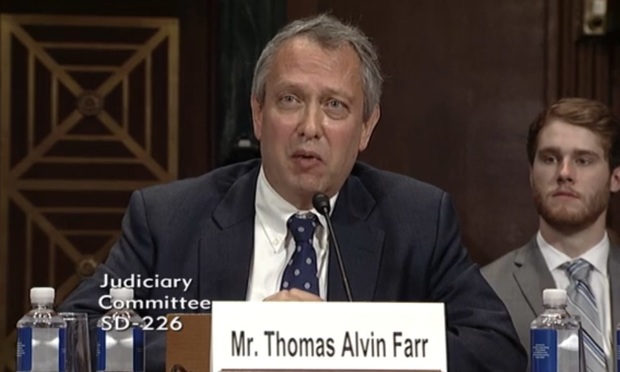Ogletree Shareholder's Federal Judge Nomination Appears Sunk
Farr's confirmation appears to have collapsed a day after the vice president had to break a tie to advance the nomination to the Senate floor for a vote.
November 29, 2018 at 07:06 PM
4 minute read
The original version of this story was published on National Law Journal
 Ogletree's Thomas Farr appeared in September for his confirmation hearing. (Photo: Screen grab via US Senate Judiciary Committee)
Ogletree's Thomas Farr appeared in September for his confirmation hearing. (Photo: Screen grab via US Senate Judiciary Committee)
The nomination of Thomas Farr, a controversial judicial pick up for an Eastern District of North Carolina seat, appeared dead Thursday evening after Sen. Tim Scott, R-South Carolina, announced he would not support the nominee.
In a statement first reported by a South Carolina newspaper, Scott said his opposition came after he spent time reviewing a 1991 Justice Department memo that included details of Farr's past work on the campaigns of former Sen. Jesse Helms in North Carolina.
The memo, reported by the Washington Post, described Farr as “the primary coordinator” of an effort that included sending postcards to voters in mostly black precincts. It said the mailing was “designed to serve as a basis to challenge voters on election day.”
The White House did not return a request for comment Thursday. Farr—currently a Raleigh, North Carolina-based shareholder at Ogletree, Deakins, Nash, Smoak & Stewart—also did not respond to a request for comment.
North Carolina Republican Party Chairman Robin Hayes told the Associated Press that Farr is “fundamentally an honest, decent and honorable man, who did nothing to deserve the assault on his character. We will continue to work to see him confirmed.”
Scott's opposition comes a day after Farr's nomination advanced to a Senate floor vote. Vice President Mike Pence broke a 50-50 tie on cloture Wednesday, which cleared the way for a floor vote. Scott had voted to advance Farr's nomination.
All 49 Senate Democrats voted against cloture. Sen. Jeff Flake, R-Arizona, had previously announced he would vote against Farr's bid, in part holding out his vote until legislation meant to bolster special counsel Robert Mueller's job security received a vote.
If the White House withdraws Farr's bid, it will be the second time Scott's opposition has felled a judicial nomination. Ryan Bounds' nomination to the Ninth Circuit was pulled after Scott, the lone black Republican in the Senate, came out against his bid.
That came after Bounds' writings as an undergraduate student, including a column railing against “race-focused groups” on college campuses, surfaced.
Farr, whom President Donald Trump nominated in July 2017, has faced a firestorm of controversy throughout his nomination, largely revolving around his past defense of voting restrictions. The Congressional Black Caucus last year described Farr as “the preeminent attorney for North Carolina Republicans seeking to curtail the voting rights of people of color.”
Civil rights and progressive legal groups have opposed him over what they describe as a record of hostility to voting rights. Critics such as Georgia Democratic gubernatorial candidate Stacey Abrams have cited, for example, his defense of a 2013 North Carolina voter identification law in addition to his work for Helms. A Fourth Circuit panel struck down the identification law, finding it targeted black voters with “almost surgical precision.” The Supreme Court did not take up Farr's appeal.
“It is no exaggeration to say that had the White House deliberately sought to identify an attorney in North Carolina with a more hostile record on African-American voting rights and workers' rights than Thomas Farr, it could hardly have done so,” members of the Congressional Black Caucus wrote in their letter to the U.S. Senate last year, opposing his nomination.
“We believe that Mr. Farr's record raises serious questions regarding his commitment to equal justice under the law that disqualifies him from service on the federal bench,” they said.
The district court seat to which Farr has been nominated has been vacant since 2005, making it the country's longest federal judicial vacancy.
President George W. Bush had nominated Farr to the seat during his tenure, but Farr's nomination failed to advance under the then-Democratic majority in the Senate.
A version of this article first ran in the National Law Journal, a Daily Report affiliate. The Daily Report added a quotation from the Associated Press.
Read more:
President Trump Is Packing the Courts With Law Firm Partners
For Trump Nominees, Road to the Bench Included Familiar Clerkship Stops
Anthony Kennedy Walks Through His Secret Retirement Plans
Ryan Bounds, Trumps Ninth Circuit Nominee, Withdrawn From Senate Floor Vote
This content has been archived. It is available through our partners, LexisNexis® and Bloomberg Law.
To view this content, please continue to their sites.
Not a Lexis Subscriber?
Subscribe Now
Not a Bloomberg Law Subscriber?
Subscribe Now
NOT FOR REPRINT
© 2025 ALM Global, LLC, All Rights Reserved. Request academic re-use from www.copyright.com. All other uses, submit a request to [email protected]. For more information visit Asset & Logo Licensing.
You Might Like
View All
A Plan Is Brewing to Limit Big-Dollar Suits in Georgia—and Lawyers Have Mixed Feelings
10 minute read
On The Move: Kilpatrick Adds West Coast IP Pro, Partners In Six Cities Join Nelson Mullins, Freeman Mathis
6 minute read

Did Ahmaud Arbery's Killers Get Help From Glynn County DA? Jury Hears Clashing Accounts
Trending Stories
- 1Exits Leave American Airlines, SiriusXM, Spotify Searching for New Legal Chiefs
- 2Etsy App Infringes on Storage, Retrieval Patents, New Suit Claims
- 3The Secret Prior Art Problem Rears Its Ugly Head
- 4Four Things to Know About Florida’s New Law to Protect Minors Online
- 5US Supreme Court Considers Further Narrowing of Federal Fraud Statutes
Who Got The Work
J. Brugh Lower of Gibbons has entered an appearance for industrial equipment supplier Devco Corporation in a pending trademark infringement lawsuit. The suit, accusing the defendant of selling knock-off Graco products, was filed Dec. 18 in New Jersey District Court by Rivkin Radler on behalf of Graco Inc. and Graco Minnesota. The case, assigned to U.S. District Judge Zahid N. Quraishi, is 3:24-cv-11294, Graco Inc. et al v. Devco Corporation.
Who Got The Work
Rebecca Maller-Stein and Kent A. Yalowitz of Arnold & Porter Kaye Scholer have entered their appearances for Hanaco Venture Capital and its executives, Lior Prosor and David Frankel, in a pending securities lawsuit. The action, filed on Dec. 24 in New York Southern District Court by Zell, Aron & Co. on behalf of Goldeneye Advisors, accuses the defendants of negligently and fraudulently managing the plaintiff's $1 million investment. The case, assigned to U.S. District Judge Vernon S. Broderick, is 1:24-cv-09918, Goldeneye Advisors, LLC v. Hanaco Venture Capital, Ltd. et al.
Who Got The Work
Attorneys from A&O Shearman has stepped in as defense counsel for Toronto-Dominion Bank and other defendants in a pending securities class action. The suit, filed Dec. 11 in New York Southern District Court by Bleichmar Fonti & Auld, accuses the defendants of concealing the bank's 'pervasive' deficiencies in regards to its compliance with the Bank Secrecy Act and the quality of its anti-money laundering controls. The case, assigned to U.S. District Judge Arun Subramanian, is 1:24-cv-09445, Gonzalez v. The Toronto-Dominion Bank et al.
Who Got The Work
Crown Castle International, a Pennsylvania company providing shared communications infrastructure, has turned to Luke D. Wolf of Gordon Rees Scully Mansukhani to fend off a pending breach-of-contract lawsuit. The court action, filed Nov. 25 in Michigan Eastern District Court by Hooper Hathaway PC on behalf of The Town Residences LLC, accuses Crown Castle of failing to transfer approximately $30,000 in utility payments from T-Mobile in breach of a roof-top lease and assignment agreement. The case, assigned to U.S. District Judge Susan K. Declercq, is 2:24-cv-13131, The Town Residences LLC v. T-Mobile US, Inc. et al.
Who Got The Work
Wilfred P. Coronato and Daniel M. Schwartz of McCarter & English have stepped in as defense counsel to Electrolux Home Products Inc. in a pending product liability lawsuit. The court action, filed Nov. 26 in New York Eastern District Court by Poulos Lopiccolo PC and Nagel Rice LLP on behalf of David Stern, alleges that the defendant's refrigerators’ drawers and shelving repeatedly break and fall apart within months after purchase. The case, assigned to U.S. District Judge Joan M. Azrack, is 2:24-cv-08204, Stern v. Electrolux Home Products, Inc.
Featured Firms
Law Offices of Gary Martin Hays & Associates, P.C.
(470) 294-1674
Law Offices of Mark E. Salomone
(857) 444-6468
Smith & Hassler
(713) 739-1250






